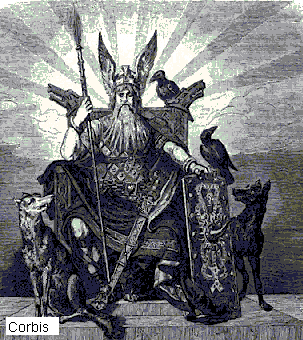
Overdeities page
ancient polytheism:
Egyptian Overview
Norse Overview
War Deities
Underworld Deities
 Odin was considered the "ruler" of the Norse pantheon for several reasons. Among them was his consideration as a member of the Aesir god race/cult. This "race" or cult of gods in the Norse pantheon consisted of the most powerful and significant gods, including those that were and were not gods of the present standards. Other ancient deities that no longer had power were also numbered among the ranks of the Aesir, and Odin's presence among the cult was one of the reasons for his consideration as the ruling god of Norse polytheism.
Odin was considered the "ruler" of the Norse pantheon for several reasons. Among them was his consideration as a member of the Aesir god race/cult. This "race" or cult of gods in the Norse pantheon consisted of the most powerful and significant gods, including those that were and were not gods of the present standards. Other ancient deities that no longer had power were also numbered among the ranks of the Aesir, and Odin's presence among the cult was one of the reasons for his consideration as the ruling god of Norse polytheism.Another facet of Odin's existence as the ruling god of the Norse was his paternal role among the gods. Odin was seen as the father of all gods (the gods at the time) in the Norse pantheon--even Thor, his virtual second-in-charge god.
Odin's standing as the ruling god of the Norse pantheon can also be seen through his other roles. Odin's other purposes as a god are among the most important roles to any culture: knowledge and battle. The god of knowledge, Odin is said to have hung from Yggdrasil, the World Tree, and read the runes of knowledge from the ground, later delivering them to the Norse people. He also served as the god of honorable combat, and offerings were frequently made to him of those opponents who were killed with honor. His other role was that of the Underworld god. He rode through the dimensions--the only being able to do so--on Sleipnir, his 8-legged horse, delivering the souls of the honorable slain in battle to the Norse underworld. So through Odin's other 3 roles in the Norse pantheon, one can also see Odin's prominence as the ruling god in the Norse religion.
Odin actually served one more role to the Norse people, but this role of his came to be out shadowed by Thor in later years. Odin served as the god of war to the Norse people until Thor "took over" the position. In actuality, Odin served as a major god of war to the greatest of men throughout the religion's standing, and it was he to whom the most intelligent soldiers aspired to imitate, not Thor. So in actuality, the Norse religion had essentially two gods of war: one for the intelligent generals and higher-ranked men, as well as those who aspired to be the "thinking" kind of soldier, Odin being worshipped by these people, and one for the "grunt" soldiers who served only as the lowest of infantry, Thor being worshipped by these barbarians. But as the magnitude of the Nordic forces grew, the number of low-level soldiers grew far greater than the number of generals and military intellectuals, so the worship of Thor grew over the worship of Odin as the main war deity.

Greek

Egyptian

Norse